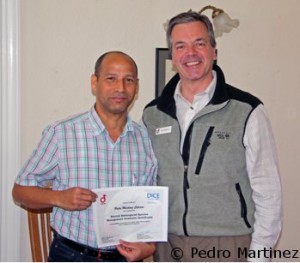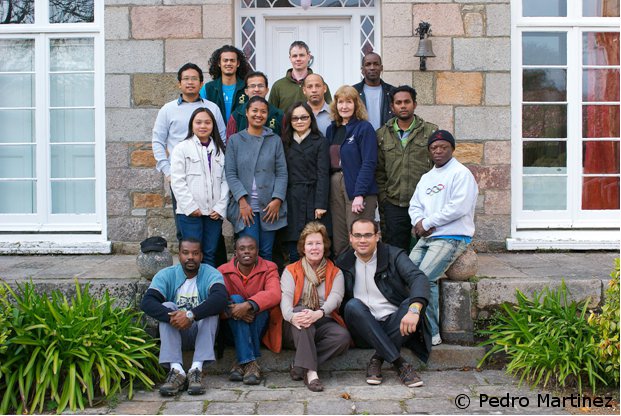Pedro Martinez is a biologist who works for the Last Survivors Project in the Dominican Republic which aims to conserve EDGE species such as the Hispaniolan solenodon and other native mammals like the hutia. He is involved in research design and field surveys, project management and conservation planning, and earlier this year he attended a course at the Durrell Institute to build on his conservation skills and knowledge.
On Thursday the 3rd of February I packed some clothes and traveled to the UK channel island of Jersey to participate in the Durrell Endangered Species Management Graduate Certificate 2012 (DESMAN) at the Durrell WildLife Conservation Centre. The course is designed to help people working in conservation around the world deal with some of the most crucial challenges that critically endangered or nearly extinct species are facing.
The centre was founded by the English naturalist Gerald Durrell in the 1970s specialising in island conservation around the world, and now a growing army of different generations of people everywhere continue to be inspired by Durrell’s lifetime commitment to protecting biodiversity. He believed that zoos could play an important role and that training people in conservation theory, methods and practice is essential for future success. The Durrell Institute has so far accumulated more than 35 years of experience bringing species back from the edge of extinction, such as the Mauritius kestrel (Falco punctatus), echo parakeet (Psittacula eques), Mauritius pink pigeon (Nesoenas mayeri), and ploughshare tortoise (Astrochelys yniphora).

I am one of the lucky ones who was given a once in a lifetime opportunity to take advantage of this great experience. People from 14 different island states (Mauritius, Hawaii and the Seychelles to name a few) took part in the DESMAN course this year, and like me, are learning about and sharing their experiences of dealing with critically endangered species.
The course gave us all some valuable insights from some of the leading conservationist practitioners and scientists working in the field, such as understanding the species on our islands, why biodiversity is important, restoring an ecological balance on islands, the elements of a leadership approach in conservation, and how to be a good leader in our field. We also managed to fit in a very busy week of practical work!
These three months have been very intensive in terms of the amount of information we have had to digest and process, but at the same time they have been very productive through use of realistically applicable case studies among other elements. I am convinced that when the time comes the skills learned on this course will prove to be very effective in helping us to solve any situation we face.
We are all going to stay in contact through the Durrell Wildlife Institute network, which aims to keep participants informed about the latest developments in the field of conservation as well as to assess the long-term success of former trainees in their respective countries and organisations. Being a part of the DESMAN 2012 has been a really extraordinary experience and one that will stay with me for life, and I am proud to say that now I am a fully-fledged member of Durrell’s international ‘Conservation Army’.

If you are interested in learning more about the work of the Durrell Wildlife Conservation Trust click here. Still thinking of applying for an EDGE Fellowship? Send your application to fellows@edgeofexistence.org before the 31st of May.